Knee Walkers also commonly referred to as “knee scooters” are one of the most popular pieces of medical equipment on the market today. There are literally thousands of knee walkers purchased or rented everyday across the country and for good reason because they work. But with so many different Knee Walkers available on the market today you might be asking yourself how do I choose the right Knee Walker for myself or a loved one? Well this is a question I get asked a lot by our customers over at CSA Medical Supply so I set out to write this Ultimate Guide to help you Choose The Correct Knee Walker.
What This Guide Will Cover
This guide will cover the most common question I get asked daily by our customers and a couple other subjects that will help you choose the right knee scooter for yourself. Below is a list of what this guide will cover
- What exactly a Knee Walker is, for those of you who have been living under a rock for the past year.
- What Injuries a Knee Scooter can be Used For
- When You Shouldn’t use a Knee Walker
- Benefits of Using a Knee Walker Instead Of Crutches
- How To Get Your Knee Scooter
- Are Knee Walkers/Scooters Covered By Insurance
- Best Knee Walkers On The Market Today For Adults
- Best Pediatric Knee Walkers On The Market Today
Well that cover’s about everything that I will be talking about in this guide and like always if you have any questions feel free to comment below or shoot me an email at info@csamedicalsupply.com and I will be happy to answer any and all of your question, all though I think you might be a Knee Walker expert after reading this. Well that’s get started.
What Is a Knee Walker?
A knee walker also called a knee scooter (for it’s similarity to those scooters we loved as a kid) is a piece of medical equipment designed as a crutch alternative. Most standard knee walkers on the market today come in a four wheel designs all though some manufactures do make a 3 wheel knee walker . Over the years Knee Walkers have evolved greatly to improve the maneuverability, comfort, and safety for the user. Most Knee Walkers on the market today are made of lightweight aluminum or galvanized steel, feature handbrakes, and can easily be folded up for storage and transport.
How To Use a Knee Walker
A knee walker is fairly simple to use but if wrongly used or careless used can be dangerous follow these 3 steps to properly use your knee walker (Seriously You Don’t Want To Re-injury your foot and have to explain to your doctor how you fell off your knee walker while racing your kid down the driveway)
- Place your injured leg on the center pad of your knee scooter with your knee bent at 90 degrees and your weight resting on your shin (tibia)
- Place you uninjured leg firmly on the ground and use your foot to propel you forward.
- If you followed step 1 & 2 your well on your way becoming a knee scooter master, just take it slow and always keep your eyes up on what your doing (Texting and using a knee walker is dangerous)
Things You Should Be Aware Of While Using Your Knee Walker
Knee walkers are great but there are some terrains and obstacles that you should definitely be aware of while using your knee walker to get around your house or neighborhood. The list below details some situations that you should avoid while using your knee walker.
- Steep Roads & Hills; if you live in a neighborhood that has steep sidewalks, roads, or hills you should definitely be extremely cautious if you are going to go down them with your knee walker. And depending on the model of knee walker you are using I recommend completely avoiding going down any steep terrain with your walker.
- Gravel, rocks, sand, and grass unless you have an all terrain knee walker going over any of the mentioned surfaces is not advised.
- Large objects in your path including speed bumps, raised sidewalks, and shoes.
What Injuries a Knee Scooter can be Used For
Knee Scooters/Walkers where designed to be only used in accordance with lower leg injuries that require the patient to keep weight off the injury following surgery or recovery. The lower leg injuries that a knee walker can be used with include the following
- Fractured Ankle
- Ankle Injury
- Ankle Sprains
- Following Ankle Surgery
- Fractured Foot
- Following Foot Surgery
- Achilles rupture
- Achilles tear
When You Shouldn’t use a Knee Walker
While Knee Walkers are a great way to get around following a injury or surgery there are instances when you should never use a knee walker. This includes the following
- Injury that requires a cast above your knee in which you are unable to bend your knee 90 degrees.
- When you have balancing issues either pre-existing or caused by injury.
- If you have injuries to both legs.
- If you have impaired strength and are unable to rebel the knee walker forward.
Benefits of Using a Knee Walker Instead Of Crutches
Lets face it anyone who’s ever had to use crutches can agree on one thing crutches suck! When your using crutches most of your body weight is supported by your forearm’s and underarms. The problem with this is that our body designed our legs to support our weight and not our arms, and especially not our underarms. In fact there are nerves that run under your arms (intercostobrachial nerve) and by using crutches for extended period of time you run the risk of severely injuring this nerve. The following is the benefits of using knee walkers compared to crutches.
- Unlike crutches that put all of your weight on your underarms and forearms a knee walker places all of your weight on your shin (know as your tibia in the medical community). The tibia is one of the strongest bones in the human body and designed to hold your weight unlike your forearm’s and underarms.
- In addition a knee walker allows you to get around your home or work place faster, and easier.
- A knee walker gives you more stability compared to crutches there by lowering your risk of falling and re injuring yourself.
- Eliminates underarm pain you get when using crutches.
How To Get Your Knee Scooter/Walker
When it comes to getting a knee scooter for yourself you have 3 options
- Purchase your knee scooter from and online medical supplier or local medical supply store
- Rent your knee scooter.
- Have your insurance provider pay for your knee scooter
Renting A Knee Scooter/Walker
Renting a knee scooter is a great option if you will only be needing it for less then 3 months. Many medical suppliers will rent their customers knee scooters at a substantial discount compared to purchasing the knee scooter. At CSA Medical Supply we rent knee scooters for $100 a month with free shipping compared to purchasing a knee scooter for $180-$300 depending on the model. If your interested in renting a knee scooter from us simply go here if not simply call your local medical supplier and ask if they rent knee scooters or contact your doctor’s office and ask if they know a medical supplier that rents knee scooters they usually have one supplier that they refer all their patients to.
Are Knee Walkers/Scooters Covered By Insurance
This is a question we get asked a lot at CSA Medical Supply, as a licensed DME and HME provider we bill a variety of different insurance providers including Medicare, Medicaid, and private insurance and to be honest every insurance providers coverage is different when it comes to covering the purchase of a knee walker/scooter. For starters the HCPCS code (“hick picks”) for all knee walkers on the market today is E0118 this is important because in order for an insurance provider to cover your knee walker it must be from a manufacturer who has gotten there knee walker approve through nordian as a medical device. If a knee walker you are looking to have covered by your insurance does not have a HCPCS code IT WILL NOT BE COVERED!
How To Get Your Knee Walker Covered By Insurance
Most insurance providers will either cover the purchase or rental of a knee walker or scooter following surgery or a lower leg injury. In order to have your insurance company cover your knee walker you will need the following
- Signed Prescription From Your Doctor
- Documentation of medical necessity (Medical Records)
I do recommend contacting your insurance provider directly and simply asking them if under your insurance plan do they cover knee walkers or knee scooters, and if so will you have to pay anything out of pocket such as copay, coinsurance. Once you have found out your insurance provider will cover your knee walker you will then either have to find a local or national DME provider that is in your insurance network that will bill your insurance company (If your interested in getting your knee walker through CSA Medical Supply give us a call today at (855) 272-633). Now if you are in a manged care network or have an HMO insurance policy you can only go to an in network provider which your insurance provider will refer you to.
Choosing a Knee Walker
When it comes to choosing the best knee walker for yourself or a loved one the decision can be tough one. There are many different knee walker manufacturers, and models available today. So how do you know which one’s right for you. When purchasing a knee walker there are three things you should look at.
- Weight and height capacity make sure the knee walker you are purchasing will actually work for you. This means that the adjustable handle bars will be able to adjust to fit your height, and your knee walker will be able to support your weight.
- Turning Radius make sure the knee walker has an adequate turning radius. If you will be using your knee walker in a home, or office which requires you to make tight turns make sure your knee walker is capable of performing these turns.
- Can the knee walker be used outside? Depending on your commute to work, lifestyle, or area you live in you may need a knee walker that can be used outside. Most knee walkers on the market today are only designed to be used inside.
Best Knee Walkers For Adults
There are many different knee walkers on the market today and nearly all of the them are designed to be used strictly by adults. We created this quick list of the 3 best knee walkers for adults on the market today. All 3 of these knee walkers have there pros and cons which we have listed below.
All Terrain Steerable Knee Walker By Knee Rover
The All terrain knee walker is in a league of its own when it comes to knee walkers. Unlike all other knee walkers that can only be used on flat surfaces, the All Terrain can go over grass, gravel, dirt, and speed bumps, it really is the ATV of knee walkers. If you need a knee walker that can handle any terrain you might come across on your commute to work or while at your home this is the knee walker for you.
Pros:
- Large 12″ tires
- Weight Capacity can hold up to 400 lbs
- Rear Brakes
- Can be used by individuals from 5′ to 6′ 5″
Cons
- Price
- Turning radius
Dual Pad Steerable Knee Walker with Basket by Drive Medical
When it comes to knee walkers Drive Medical manufactures some of the most economical and high quality walkers on the market today. Two things that are not so easy to find these days when it comes to knee scooters. The Dual Pad Steerable Knee walker is super easy to assemble thanks to its click in design, and the front basket allows you to store your purse or other valuables so you don’t have to hold it your hands.
Pros:
- Price just $169.99
- Can hold up to 300 lb
- Front basket is included
- Easily Assembles
- Unique pad design gives optimum comfort
Cons:
- Designed to only go over smooth terrain
- Turning radius
Swivelmate Steerable Knee Walker
If your looking for a knee walker with a tight turning radius that will let you easily navigate your home or office’s tight turns the Swivelmate is for you. This lightweight knee scooter’s unique design featuring 3 front wheels allows it to have a industry leading 90 degree turning radius.
Pros:
- 90 degree turning radius
- Designed to work for people 5′ to 6′ 5″
- Can hold up to 400 lbs
- Lightweight design
- No assembly needed
Cons:
- Price
- Designed to used only on smooth surfaces
Best Knee Walkers For Children
With the growing popularity of knee walkers medical equipment manufacturers rushed to design the next best knee walker for adults while completely ignoring the thousands of children who would love to be able to ditch there crutches for a nice new knee walker. Well one manufacturer answered the call and has created the very best knee walkers for children. The pros and cons of purchasing these knee scooters is listed below.
All Terrain KneeRover Jr Steerable Knee Walker
The Knee Rover Jr has all the same awesome features as the All Terrain Knee walker but specifically designed to be used by children. The large 1o inch tires can handle all most any terrain your child my come across including grass, and gravel.
Pros
- Can hold up to 250 lb
- Can handle a variety of different terrains.
- Designed to work for children that are 4′ up to 5′ 9″
- Features a front basket for storage of books, backpacks, and anything else that may need storage
Cons
- Turning Radius
Knee Walker Jr Steerable Knee Walker
The Knee Walker Jr was the first knee walker ever designed for children and small adults. It’s lightweight design allows your child to easily navigate at school and home. The fold-able front handlebars allows it to be easily stored in the back seat of your car or trunk.
Pros
- Accommodates patient heights 3′ 6” to 5’ 4”
- Tool Free Assembly
- Comes with front storage basket
- Easily stores
- Price
- Can Support up to 160 lbs
Cons
- Turning Radius
Conclusion
Well if you read this entire article all 2500 words you now know more about knee walkers then about 99.9% of people in this world. You learned what a knee walker is, how to get your knee walker covered by insurance, and even the best knee walkers on the market today. But if you still might have a question or feel that I should add something else to this guide please comment below or email me at info@csamedicalsupply.com
References
https://en.wikipedia.org/wiki/Knee_scooter
http://uconnsportsmed.uchc.edu/injury/lowerleg/
https://en.wikipedia.org/wiki/Intercostobrachial_nerve
https://www.medicare.gov/supplierdirectory/search.html
https://med.noridianmedicare.com/

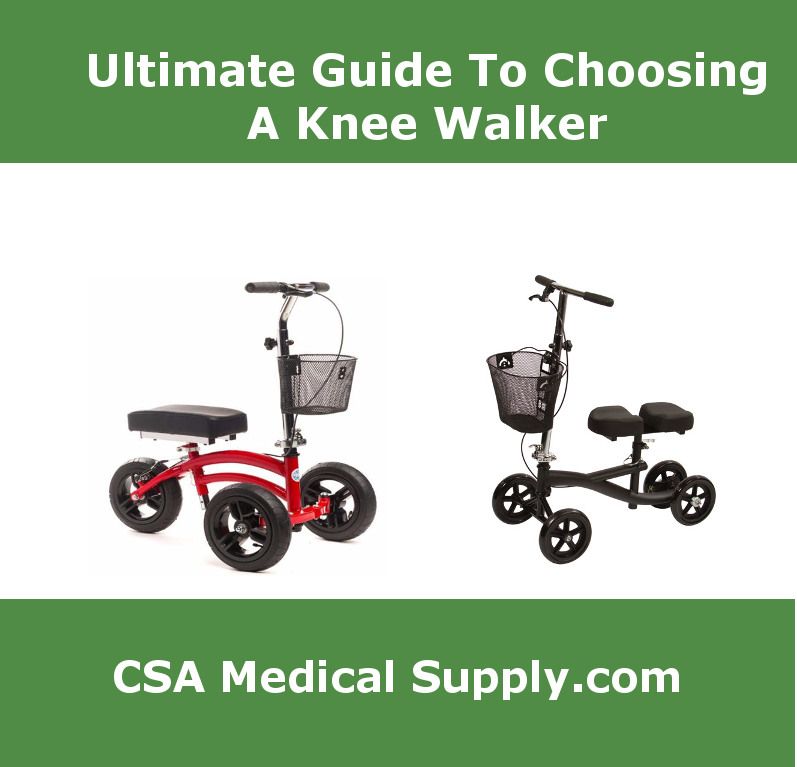

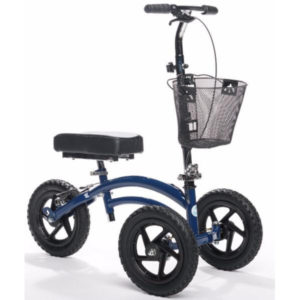

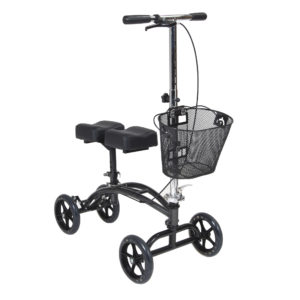
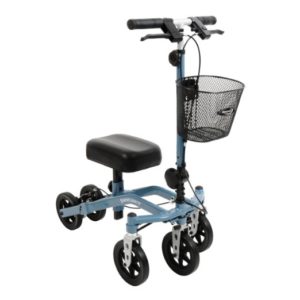
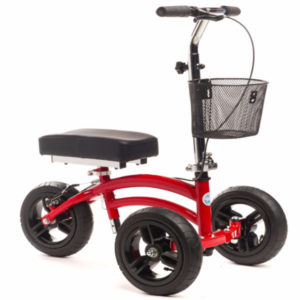
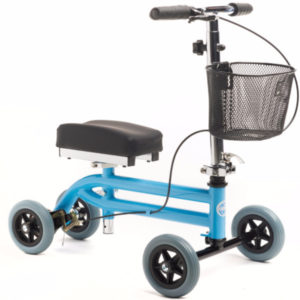

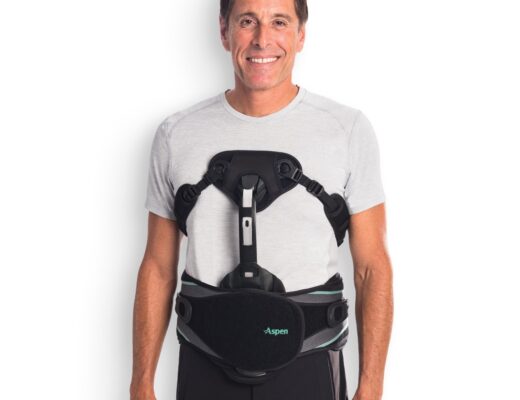
No Comments